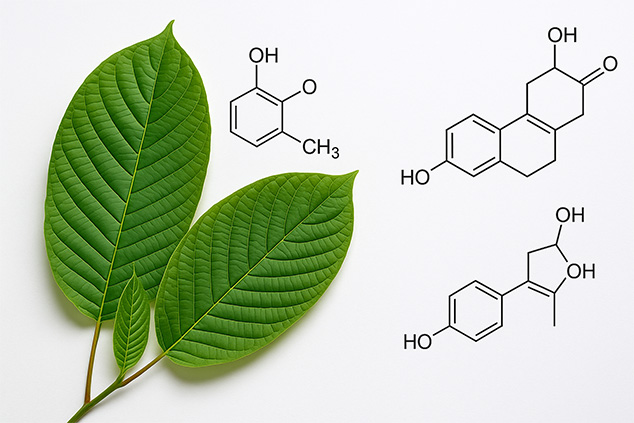While kratom has numerous beneficial effects, some people have noticed that kratom effects are different during periods or influence their sex drive. So, they start wondering whether kratom affects their hormones.
Studies on Kratom and Hormones
The popularity of kratom is rapidly rising. Nonetheless, various institutions are not in favor of kratom. As a result, at this time, there are only limited studies on kratom and its alkaloids.
There is a lot that we do not yet know about this Southeast Asian herb yet. However, this may soon change. NIDA (The National Institute on Drug Abuse) awarded the US College of Pharmacy with two grants worth $6.9 million.
For a total of 7 years, the US College of Pharmacy will study the effects of individual kratom alkaloids on the human brain as well as their effects when working together. This will provide us with reliable information that will show the capabilities of the herb on a much larger scale.
Why the US College of Pharmacy, and Will the Results Be Reliable?
It’s not a secret that the FDA wants kratom banned, though its motivations are not absolutely clear. A few years ago, the FDA produced its own algorithm stating that kratom is an opioid.
This biased finding met with backlash. The American Kratom Association requested the FDA to provide a thorough 8-Factor Analysis to demonstrate how the herb and its alkaloids are dangerous effects. Yet, it had not occurred. However, since 2016, when the DEA made an announcement to ban kratom, both the FDA and NIDA have changed their narrative. They no longer refer to kratom as an opioid but rather a drug with opioid-like properties.
When it comes to the NIDA grants, the research is lead by Christopher McCurdy. In the early 2000s, he pioneered research on kratom and has been one of the leading experts on kratom ever since.
He has a profound interest in kratom and has also indicated that he prefers to remain impartial and follow the science. Because of that, he has never tried kratom himself.
So, it’s safe to assume that the results of his work will provide reliable results.
Yet, there is still much time left until we are going to learn about the results of these studies. So, let’s take a look at the existing studies on kratom and hormones as well as on user experience and recommendations.
Does Kratom Affect Hormones
Keep in mind that kratom is not yet thoroughly studied. As a result, many people tend to attribute unexplained outcomes to kratom. However, that does not necessarily mean that kratom is the cause. Our hormonal systems are complex, and medications, supplements, and other substances that you may be taking can have an effect on your hormones rather than kratom.
Kratom and Testosterone
Low testosterone can not only affect males. In females, low testosterone can result and reduced libido and low sex drive.
You may have come across people or sources indicating the connection between kratom and low hormone testosterone levels. Yet, that isn’t actually proof that kratom actually lowers testosterone levels.
What does affect testosterone is opioids. Studies prove that long-term opioid use is linked to low hormone testosterone levels. Opioids negatively affect the release of chemicals that trigger the production of testosterone.
Yet, kratom is not an opioid, and it interacts with the opioid receptors in our brain differently than opioids do.
Moreover, a study in Malaysia lead by Darshan Singh, another person who studies kratom and has appeared in the documentary A Leaf of Faith, investigated the effects of regular consumption of kratom tea on hormone testosterone levels.

The study followed 19 kratom tea drinkers over a period of over two years. Kratom use had no effects on their testosterone, follicle-stimulating hormone (FSL), or luteinizing hormone (LH).
Keep in mind though that if one is taking kratom to curb their opioid use, they may have low testosterone levels resulting from prolonged opioid use.
Other factors can lower testosterone, too, such as:
- Intake of soy products – soy contains phytoestrogens, natural plant compounds that resemble estrogen,
- High dairy intake – dairy contains cow hormones and cows may have been fed soy products which can result in dairy containing hormones such as estrogen,
- Smoking,
- Excessive weight and obesity,
- Alcohol,
- Mint,
- Licorice root,
- Diabetes,
- Marijuana use,
- Medication such as prescription opioids,
- The onset of menopause,
- Aging, and
- Sedentary lifestyle.
Therefore, it is important to examine your health and condition as a whole before attributing low testosterone hormone levels to kratom.
Kratom and Estrogen
No studies currently isolate the effect of kratom on the hormone estrogen. Nonetheless, estrogen production is connected to FSH and LH mentioned in the section above. According to current studies, kratom does not affect either one of them.
Since nothing currently indicates a link between kratom and hormones, it’s important to approach hormonal issues holistically.
As with testosterone, there are various factors that can affect estrogen levels, such as:
- Aging,
- Hormonal issues such as PCOS and ovarian cysts,
- Excessive exercise,
- Low progesterone levels,
- Extreme dieting,
- Eating disorders, and
- Pituitary gland disorders.
Since hormonal disorders are usually complex, it’s important to test their levels to see what needs to be balanced.
Have you experienced any issues with your hormones? Do you think kratom is affecting your hormones? Are there other issues that you experience?



Leave a Reply